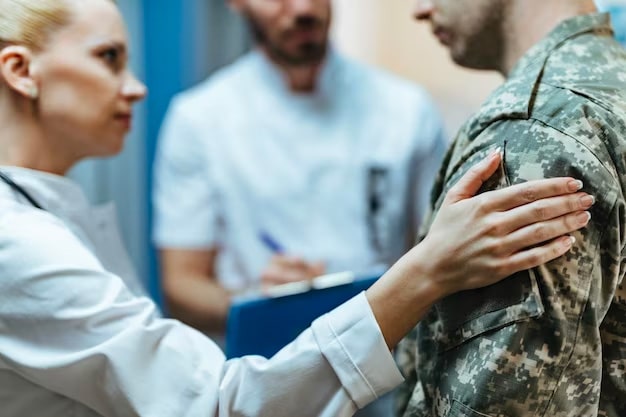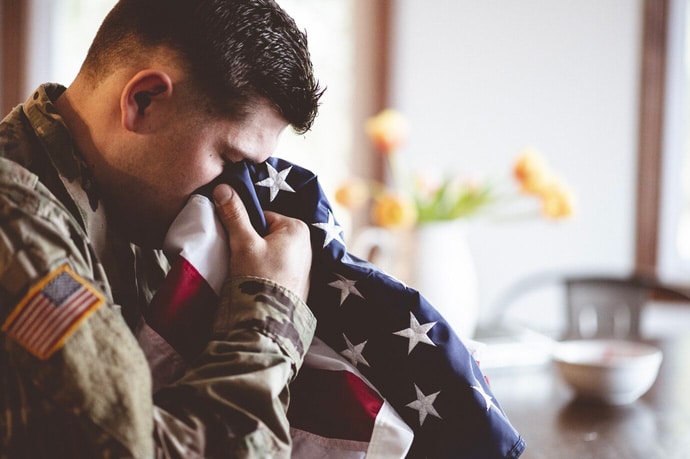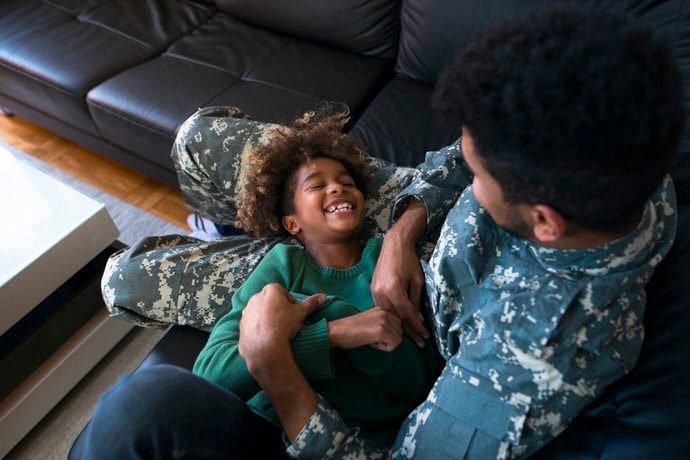Veterans
Helping our Nation’s Veterans recover from Mental Health & Substance Abuse Issues.
Request a Callback
"*" indicates required fields
Specialized Treatment
Mental Health & Substance Abuse challenges can affect anyone, regardless of their background. However, for many veterans, these issues are not just potential but harsh realities.
Veterans often face unique mental health struggles, compounded by substance abuse, and are frequently underserved and overlooked, left to navigate their challenges alone.
At Relevance Recovery, we are committed to providing top-tier mental health and addiction services tailored specifically for Veterans in New Jersey. We believe that addressing the root causes of addiction, especially those related to mental health, is essential for effective treatment and recovery.

Take Our Free Quiz & Embark On a Journey to Understanding & Support
Am I Suffering From Substance Abuse
Am I Depressed
Do I have Anxiety
Do I have PTSD
Request a Callback
"*" indicates required fields
Veterans Mental Health
At Relevance Recovery, we are deeply committed to supporting veterans and their mental health needs. Our tailored programs and services are designed to address the unique challenges faced by veterans, including substance abuse and mental health disorders. We believe in providing compassionate care and empowering veterans to achieve lasting recovery and improved mental well-being.
Have more questions?
Contact our admissions team at 908-415-4837
Program Highlights:
- Holistic & Advanced Medical Team
- Individualized Treatment Plans
- Advanced Genetic and DNA Testing
- Safe & Supportive Housing
- Multiple Pathways Approach
- Family Owned and Operated
Veterans often face unique challenges that can impact their mental health. At Relevance Recovery, we recognize the sacrifices our veterans have made and offer specialized support tailored to their needs. Our comprehensive programs address the underlying issues that contribute to mental health challenges, providing veterans with the tools and resources they need to heal and thrive.
Post-Traumatic Stress Disorder (PTSD) can affect anyone who has experienced a traumatic event. At Relevance Recovery, we understand the impact PTSD can have on mental health and well-being. Our specialized programs offer compassionate care and evidence-based treatments to help individuals manage their symptoms and reclaim their lives. With our support, you can find healing and hope on your journey to recovery.
Depression is a common mental health condition that can affect anyone, regardless of age, gender, or background. At Relevance Recovery, we understand the toll depression can take on individuals and their loved ones. Our holistic approach to treatment addresses the underlying causes of depression, helping individuals develop coping strategies and regain a sense of balance and purpose in their lives. With our support, you can take the first steps toward healing and rediscover joy and fulfillment.
Anxiety is a natural response to stress, but when it becomes overwhelming or persistent, it can interfere with daily life. At Relevance Recovery, we offer compassionate support and evidence-based treatments to help individuals manage anxiety and regain control. Our personalized approach addresses the root causes of anxiety, empowering individuals to develop coping skills and build resilience. With our guidance, you can learn to navigate anxiety and find peace and stability.
Suicide prevention is a critical issue, especially among veterans who may face unique challenges. At Relevance Recovery, we are committed to providing support and resources to help prevent suicide among veterans. Our specialized programs address the underlying factors that contribute to suicidal ideation, offering veterans a safe space to heal and find hope. With our comprehensive approach to care, we strive to reduce the risk of suicide and support veterans in their journey to recovery.
At Relevance Recovery, we recognize the importance of supporting veterans and their families as they navigate the challenges of addiction and mental health. Our specialized family support program is tailored to meet the unique needs of military families, offering education, counseling, and resources specifically designed for veterans and their loved ones. By involving families in the recovery process, we aim to strengthen relationships, improve communication, and create a supportive environment where veterans and their families can heal together.
Our Mission is You.

Mental Health Treatment
Our mental health treatments encompass various aspects of our psychological wellbeing, including emotional, cognitive, and behavioral functions.
At Relevance Recovery, we offer comprehensive therapy in a supportive environment. Our approach integrates holistic techniques and cutting-edge treatments like esketamine and genetic testing.

Substance Use Treatment
We recognize that therapy effectiveness varies among individuals.
Our Master’s level clinical team at Relevance Recovery integrates a multipathway approach to addiction treatment into our programming. This approach includes the latest evidence-based therapies and approaches.

Aftercare & Sober Living
After rehab, it’s crucial to have a plan for sober living and rebuilding your life. Consider sober living homes, join support groups, continue therapy, maintain a healthy lifestyle, and engage in hobbies.
Our partner programs offer strong accountability and peer support to help you rebuild your life and inspire lasting recovery.
Why Relevance Recovery For New Jersey Veterans ?
Our clinical team creates personalized treatment plans, with flexible and comprehensive modalities tailored to Veterans. Our Veteran’s mental health & drug rehab in New Jersey is committed to everlasting recovery for our Nation’s heroes who protected our country’s freedoms.
Veterans Substance Abuse
At Relevance Recovery, we are dedicated to assisting veterans with their substance abuse issues. Our customized programs are crafted to tackle the specific challenges veterans face, including mental health disorders intertwined with substance abuse. We prioritize providing compassionate care to empower veterans on their journey to lasting recovery and improved mental well-being.
Have more questions?
Contact our admissions team at 908-415-4837
- Detoxification
- Inpatient
- Partial Care
- Intensive Outpatient
- Evening IOP
- Virtual
Substance abuse can be a significant challenge for veterans, often stemming from the unique experiences and traumas they have faced. At Relevance Recovery, we understand the complexities of addiction in the veteran community and offer specialized programs to address these issues. Our approach combines evidence-based treatments with a deep understanding of military culture, providing veterans with the tools and support they need to overcome substance abuse and regain control of their lives. With our veteran-focused care, we are committed to helping veterans heal from the inside out and achieve lasting recovery.
Chronic pain is a common issue among veterans, often stemming from injuries sustained during service. At Relevance Recovery, we understand the physical and emotional toll that chronic pain can take on veterans and offer specialized programs to help manage pain and improve quality of life. Our holistic approach combines evidence-based treatments with complementary therapies, such as acupuncture and yoga, to address pain from multiple angles. By empowering veterans to take control of their pain management, we aim to improve their overall well-being and quality of life.
Many veterans face the challenge of dual diagnosis, which occurs when a mental health disorder, such as PTSD or depression, co-occurs with substance abuse. At Relevance Recovery, we specialize in treating dual diagnosis, offering integrated programs that address both the mental health and substance abuse issues simultaneously. Our comprehensive approach combines evidence-based therapies with personalized care plans to help veterans achieve recovery and stability. With our veteran-focused care, we are dedicated to providing the support and resources needed for veterans to overcome dual diagnosis and reclaim their lives.
Self-medication is a common issue among veterans, who may use substances to cope with the physical and emotional challenges they face. At Relevance Recovery, we understand the complexities of self-medication and offer specialized programs to help veterans address underlying issues and develop healthier coping mechanisms. Our approach focuses on providing veterans with the tools and support they need to manage their symptoms effectively and achieve lasting recovery. With our veteran-focused care, we are committed to helping veterans break free from the cycle of self-medication and live fulfilling substance-free lives.
Relapse is a common concern for veterans in recovery, but it doesn’t have to be a part of your journey. At Relevance Recovery, we understand the challenges you may face and offer specialized programs to help you identify and manage relapse triggers. Our relapse prevention strategies focus on building resilience, developing healthy coping mechanisms, and fostering a strong support network. With our comprehensive approach to care, we empower veterans to recognize and address relapse risk factors, helping them stay on track with their recovery goals.
Prescription drug misuse is a serious issue among veterans, who may be prescribed medications to manage pain, PTSD, or other conditions. At Relevance Recovery, we understand the risks associated with prescription drug misuse and offer specialized programs to help veterans safely manage their medications. Our approach includes education on the risks of prescription drug misuse, alternative pain management strategies, and counseling to address underlying issues. With our veteran-focused care, we are committed to helping veterans make informed decisions about their medications and achieve optimal health and well-being.
Specific Therapies for Veterans
Master’s Level Clinician Care
Cognitive-Behavioral Therapy (CBT) is a highly effective treatment approach for veterans dealing with mental health issues, including PTSD, depression, anxiety, and substance abuse. Here are some key benefits of CBT for veterans:
Addresses Specific Issues: CBT is tailored to address the specific challenges faced by veterans, such as trauma-related symptoms, negative thought patterns, and behavioral issues.
Evidence-Based: CBT is supported by extensive research and has been shown to be effective in treating a variety of mental health disorders commonly experienced by veterans.
Focuses on the Present: CBT focuses on the present moment, helping veterans identify and change negative thought patterns and behaviors that contribute to their mental health issues.
Teaches Coping Skills: CBT teaches veterans practical coping skills to manage stress, anxiety, and other symptoms, empowering them to better handle challenging situations.
Promotes Positive Change: CBT helps veterans develop more positive and adaptive ways of thinking, leading to improved mood, behavior, and overall well-being.
Complements Other Treatments: CBT can be used alongside other treatments, such as medication or group therapy, to enhance the overall effectiveness of treatment.
Provides Long-Term Benefits: CBT equips veterans with skills they can use long after therapy ends, helping them maintain mental health and prevent relapse.
Encourages Active Participation: CBT is a collaborative process that encourages veterans to actively participate in their treatment, increasing their sense of control and empowerment.
Overall, CBT is a valuable tool in helping veterans overcome mental health challenges and improve their quality of life.
Eye Movement Desensitization and Reprocessing (EMDR) is a therapeutic approach that has been found to be highly effective in treating PTSD and trauma-related disorders in veterans. Here are some key benefits of EMDR for veterans:
Trauma Processing: EMDR helps veterans process traumatic memories and experiences in a safe and controlled environment, reducing the emotional intensity associated with these memories.
Reduction of PTSD Symptoms: EMDR has been shown to significantly reduce symptoms of PTSD, such as flashbacks, nightmares, and hypervigilance, allowing veterans to experience relief from their symptoms.
Enhanced Emotional Regulation: EMDR helps veterans develop better emotional regulation skills, enabling them to manage their emotions more effectively in daily life.
Improved Self-Efficacy: EMDR can increase veterans’ sense of self-efficacy and empowerment, as they learn to reprocess traumatic memories and gain control over their thoughts and emotions.
Quick Results: EMDR is often a shorter-term therapy compared to traditional talk therapies, with many veterans experiencing significant improvement in their symptoms in a relatively short period.
Complementary Approach: EMDR can be used in conjunction with other therapies and treatments, such as medication or CBT, to enhance the overall effectiveness of treatment for veterans.
Long-Term Benefits: EMDR can lead to long-lasting improvements in veterans’ mental health, providing them with tools and coping mechanisms they can use for the rest of their lives.
Overall, EMDR is a valuable therapeutic approach for veterans dealing with PTSD and trauma-related disorders, offering a safe and effective way to process traumatic experiences and improve their overall well-being.
Group therapy is a valuable treatment option for veterans, offering unique benefits that complement individual therapy. Here are some key advantages of group therapy for veterans:
Peer Support: Group therapy provides veterans with the opportunity to connect with others who have had similar experiences, offering a sense of camaraderie and understanding that can be highly beneficial.
Normalization: In a group setting, veterans can see that they are not alone in their struggles, helping to reduce feelings of isolation and shame.
Social Skills Development: Group therapy can help veterans improve their social skills and communication abilities, which may have been impacted by their experiences.
Feedback and Perspective: Group members can offer valuable feedback and perspectives on each other’s experiences, providing new insights and ways of thinking about their challenges.
Behavioral Experiments: Group therapy provides a safe environment for veterans to experiment with new behaviors and interpersonal skills, with the support and guidance of the group.
Enhanced Motivation: Being part of a group can increase motivation to participate in therapy and work towards personal goals, as members support and encourage each other.
Cost-Effective: Group therapy is often more cost-effective than individual therapy, making it a valuable option for veterans who may have limited resources.
Diverse Perspectives: Group therapy brings together individuals from different backgrounds and experiences, providing a rich and diverse range of perspectives and insights.
Overall, group therapy can be a highly effective treatment option for veterans, offering a supportive and empowering environment for healing and growth.
Substance abuse counseling is a crucial component of treatment for veterans struggling with addiction. Here are some key benefits of substance abuse counseling for veterans:
Individualized Treatment: Substance abuse counseling is tailored to meet the specific needs of each veteran, taking into account their unique experiences and challenges.
Dual Diagnosis Support: Many veterans struggling with substance abuse also have co-occurring mental health disorders. Substance abuse counseling can help address these issues simultaneously, promoting holistic healing.
Behavioral Changes: Substance abuse counseling helps veterans identify and change negative thought patterns and behaviors that contribute to their substance use, empowering them to make healthier choices.
Relapse Prevention: Substance abuse counseling equips veterans with coping skills and strategies to prevent relapse and maintain sobriety over the long term.
Support and Accountability: Substance abuse counseling provides veterans with a supportive environment where they can openly discuss their struggles and receive encouragement and guidance from trained professionals.
Education and Awareness: Substance abuse counseling educates veterans about the effects of drugs and alcohol on their health and well-being, helping them make informed decisions about their substance use.
Family Involvement: Substance abuse counseling often involves family members, helping them understand their loved one’s addiction and learn how to support their recovery journey.
Community Resources: Substance abuse counseling connects veterans with community resources and support groups that can provide ongoing support and encouragement.
Overall, substance abuse counseling plays a crucial role in helping veterans overcome addiction and regain control of their lives.
Family therapy is an essential component of treatment for veterans, offering unique benefits that support their recovery journey. Here are some key advantages of family therapy for veterans:
Improved Communication: Family therapy can help improve communication between veterans and their loved ones, leading to healthier and more fulfilling relationships.
Understanding and Support: Family therapy helps family members understand the challenges faced by veterans, leading to increased empathy and support.
Healing Family Dynamics: Family therapy can address underlying issues within the family system that may contribute to or exacerbate veterans’ mental health issues, promoting healing and reconciliation.
Enhanced Coping Skills: Family therapy can teach family members effective coping skills to deal with stress and conflict, which can benefit both veterans and their loved ones.
Relapse Prevention: Family therapy can help identify triggers for relapse and develop strategies to prevent relapse, providing a strong support system for veterans in recovery.
Increased Family Involvement: Family therapy encourages family members to actively participate in the recovery process, leading to better treatment outcomes for veterans.
Holistic Healing: Family therapy addresses the needs of the whole family, promoting holistic healing and well-being for everyone involved.
Overall, family therapy is a valuable tool in helping veterans and their loved ones navigate the challenges of mental health issues and substance abuse, leading to stronger, healthier families and improved outcomes for veterans in treatment.

Other Resources
Relevance Recovery offers a wide gamut of treatment for Veterans; if you haven’t found what you’re looking for head to our Veterans Page to learn more.
Insurance Accepted











